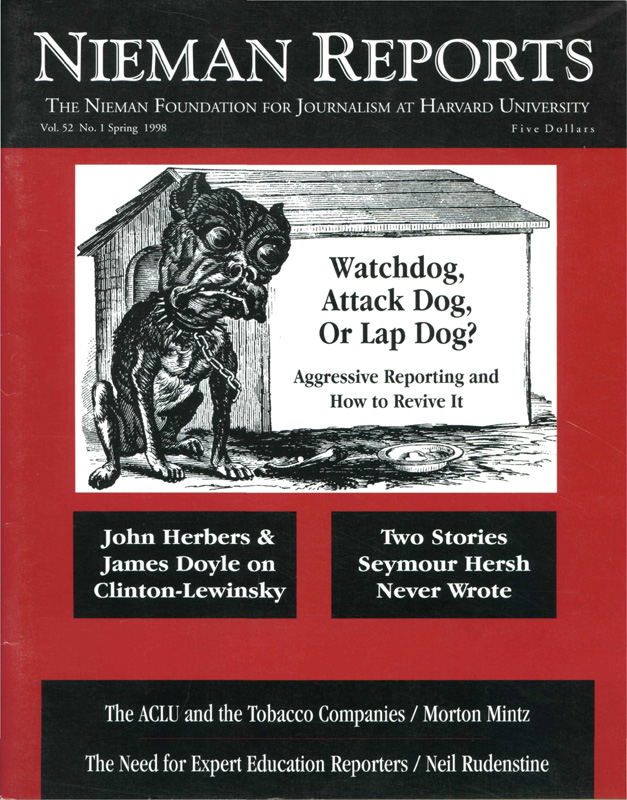
Watchdog, Attack Dog, or Lapdog?
This issue on Watchdog Journalism originated with a call by Murrey Marder, the retired Washington Post Diplomatic Correspondent, for a return to more aggressive, but responsible, reporting. The package begins with two articles on the media's handling of the accusations that President Clinton had an improper sexual relationship with Monica S. Lewinsky. Excerpts from a seminar by Seymour Hersh, the Pulitzer Prize-winning investigative reporter, follow. Then we offer position papers on the status of watchdog journalism in four areas—the economic sector, state and local government, national security and nonprofit organizations.
In April 1960, The New York Herald Tribune published 12 articles by Harry S. Ashmore, who had just left The Arkansas Gazette where he had served for 12 years, first as editorial writer, then as Editor. Two years earlier, The Gazette had been awarded a Pulitzer Prize for its coverage of attempts by Governor Orval Faubus to block minimal efforts to integrate Little Rock's Central High School in 1957. Ashmore, a 1942 Nieman Fellow, was also awarded a Pulitzer Prize for his editorials.
In 1960, Ashmore, who had written primarily about how Southerners dealt with the issue of race, decided, at the urging of Robert White, Editor of The Trib, to write a series of articles about race relations in the North and Ashmore focused his attention on Harlem.
He used the series as the foundation for a book titled: "The Other Side of Jordan: Negroes Outside the North." Ashmore noted in the introduction to the book that his use of the word "Negro" had brought down upon him the wrath of an organization called The Committee to Present the Truth About the Name "Negro," which contended that the really only acceptable term was Afro-American.
Ashmore,a man who throughout his life was guided by a sense of humor about the folly of racial prejudice, began his book with this anecdote:
"Us" was the North Star of Ashmore's life, for in his mind, the word embraced whites and blacks, especially in the South as they played out the sad ritual of race. Unlike his dear friend, Ralph McGill, Editor of The Atlanta Constitution, an Old Testament voice of outrage against segregation in his columns, Ashmore viewed the matter through the prism of absurdity. He simply believed that segregation, whatever variety, North as well as South, was a practice that insulted rationality.
And Ashmore, preoccupied then, as he had been in his earlier years with the issue of segregation, knew that by I960, the issue had become national. "In any event," he wrote in the introduction to "The Other Side of Jordan," "The South is paying in the coin of steadily diminishing national political influence for the mingled pleasure and pain of what is likely to be its last stand.
"But the not yet fully recognized fact is that the race problem is no longer the exclusive or even primary property of the South, and neither is the resistant white attitude normally associated with the beleaguered region."
I first met Ashmore in early 1958 when I went to cover Little Rock for NBC News. We were introduced by John Chancellor, who had covered the events of 1957 for NBC with particular distinction and was now going off to Europe. It was my friendship with Ashmore and other Southerners like Johnny Popham of The New York Times and his successor on the "seg beat," Claude Sitton, and Bill Emerson of Newsweek, that led me to believe that once the curse of segregation was lifted from the South, that region would make racial progress faster than the North.
Part of this was realism, part of it was romanticism on my part, no doubt induced by my admiration for the people in Little Rock who supported The Arkansas Gazette and Ashmore in the fight against Governor Orval Faubus. And I did not think for a moment that there would not be ugly times ahead in other places in the South where racial hatred was much more deeply ingrained than it was in Arkansas.
I also became indebted to Ashmore for allowing me inside the circle of friendship that he enjoyed with McGill and Bill Baggs, Editor of The Miami News. When they would gather at the Jefferson Hotel in Washington,where I was then based, the occasions served to remind me that the three of them represented what another Southerner, William Faulkner, must have had in mind when he accepted his Nobel Prize for Literature and spoke of the necessity not merely to survive, but also to prevail.
All three are now gone, McGill and Baggs more than a quarter of a century ago, Ashmore in January, after suffering a fatal stroke while helping me celebrate my 70th birthday. One minute Ashmore was talking, drinking and laughing. Then, when he rose from dinner, he fell mute, never to speak again, and in a matter of days, he was dead.
For the last 20 years, as I found myself spending an increasing amount of time in Santa Barbara, Harry and I would often lunch together and as old journalists are prone to do, we would vie with one another in an effort to embellish the past and deplore the present. We also often dined with his wife, Barbara, and my wife, Virginia. In Virginia, Ashmore found a new audience for his tales of folly and triumph. Having heard most of the stories before, I laughed on cue. But Barbara Ashmore was not so patient. Just as Ashmore was about to get to the punch line, Barbara would wave her hand at him and say: "Harry, fast forward, fast forward."
Some of his old friends gathered in Little Rock on February 17 for a memorial service, presided over by his longtime friend, U.S. District Judge Henry Woods. Old colleagues from The Arkansas Gazette, now merged with its once-arch rival. The Democrat, spoke, among them The Gazette's Publisher, Hugh Patterson, and Roy Reed, who went from The Ga2ette to The New York Times, then back home to the University of Arkansas.
Later that night, sitting in the bar of the hotel where we were staying, I raised a glass with Sitton and Emerson in memory of all that Ashmore had meant to us and to the South. We agreed that because of editors like Ashmore, McGill, Baggs, and Hodding Carter and their editorial broadsides, the South had gone much further than the North in racial matters, but much to our mutual regret, we found ourselves without Ashmore's eternal optimism about race in the rest of the nation.
It has been said that old men forget. But as we rose from the table that night, we agreed that none of us would ever forget what Ashmore meant to us when we were young reporters covering the greatest story of our careers.
I trust that Ashmore has by now been reunited with McGill and Baggs at God's private watering hole. Though I do not know what the eternal bartender is pouring, Ido know that the stories will never end. Harry, dear departed friend, fast forward forever, but not too fast. The stories, like you, are too good to forget.
Sander Vanocur now heads his own production company. Old Owl Communications
In 1960, Ashmore, who had written primarily about how Southerners dealt with the issue of race, decided, at the urging of Robert White, Editor of The Trib, to write a series of articles about race relations in the North and Ashmore focused his attention on Harlem.
He used the series as the foundation for a book titled: "The Other Side of Jordan: Negroes Outside the North." Ashmore noted in the introduction to the book that his use of the word "Negro" had brought down upon him the wrath of an organization called The Committee to Present the Truth About the Name "Negro," which contended that the really only acceptable term was Afro-American.
Ashmore,a man who throughout his life was guided by a sense of humor about the folly of racial prejudice, began his book with this anecdote:
Harlem's favorite joke these days goes like this: Two colored maids are rattling uptown on the subway at the end of the day's work. One is telling the other about her new job.
"They're fine folks to work for and it sure is interesting. They entertain a lot and know all the important people. Why just last night, we had Vice President Nixon, Adlai Stevenson, Governor Rockefeller, Senator Lyndon Johnson, Mayor Wagner, Mrs. Roosevelt, Dag Hammarskjold, Claire Booth Luce, Chief Justice Warren, Helen Hayes, Carl Sandburg and Robert Frost."
"Sure enough. When big people like that are just among themselves, what do they talk about?"
"Us!"
"Us" was the North Star of Ashmore's life, for in his mind, the word embraced whites and blacks, especially in the South as they played out the sad ritual of race. Unlike his dear friend, Ralph McGill, Editor of The Atlanta Constitution, an Old Testament voice of outrage against segregation in his columns, Ashmore viewed the matter through the prism of absurdity. He simply believed that segregation, whatever variety, North as well as South, was a practice that insulted rationality.
And Ashmore, preoccupied then, as he had been in his earlier years with the issue of segregation, knew that by I960, the issue had become national. "In any event," he wrote in the introduction to "The Other Side of Jordan," "The South is paying in the coin of steadily diminishing national political influence for the mingled pleasure and pain of what is likely to be its last stand.
"But the not yet fully recognized fact is that the race problem is no longer the exclusive or even primary property of the South, and neither is the resistant white attitude normally associated with the beleaguered region."
I first met Ashmore in early 1958 when I went to cover Little Rock for NBC News. We were introduced by John Chancellor, who had covered the events of 1957 for NBC with particular distinction and was now going off to Europe. It was my friendship with Ashmore and other Southerners like Johnny Popham of The New York Times and his successor on the "seg beat," Claude Sitton, and Bill Emerson of Newsweek, that led me to believe that once the curse of segregation was lifted from the South, that region would make racial progress faster than the North.
Part of this was realism, part of it was romanticism on my part, no doubt induced by my admiration for the people in Little Rock who supported The Arkansas Gazette and Ashmore in the fight against Governor Orval Faubus. And I did not think for a moment that there would not be ugly times ahead in other places in the South where racial hatred was much more deeply ingrained than it was in Arkansas.
I also became indebted to Ashmore for allowing me inside the circle of friendship that he enjoyed with McGill and Bill Baggs, Editor of The Miami News. When they would gather at the Jefferson Hotel in Washington,where I was then based, the occasions served to remind me that the three of them represented what another Southerner, William Faulkner, must have had in mind when he accepted his Nobel Prize for Literature and spoke of the necessity not merely to survive, but also to prevail.
All three are now gone, McGill and Baggs more than a quarter of a century ago, Ashmore in January, after suffering a fatal stroke while helping me celebrate my 70th birthday. One minute Ashmore was talking, drinking and laughing. Then, when he rose from dinner, he fell mute, never to speak again, and in a matter of days, he was dead.
For the last 20 years, as I found myself spending an increasing amount of time in Santa Barbara, Harry and I would often lunch together and as old journalists are prone to do, we would vie with one another in an effort to embellish the past and deplore the present. We also often dined with his wife, Barbara, and my wife, Virginia. In Virginia, Ashmore found a new audience for his tales of folly and triumph. Having heard most of the stories before, I laughed on cue. But Barbara Ashmore was not so patient. Just as Ashmore was about to get to the punch line, Barbara would wave her hand at him and say: "Harry, fast forward, fast forward."
Some of his old friends gathered in Little Rock on February 17 for a memorial service, presided over by his longtime friend, U.S. District Judge Henry Woods. Old colleagues from The Arkansas Gazette, now merged with its once-arch rival. The Democrat, spoke, among them The Gazette's Publisher, Hugh Patterson, and Roy Reed, who went from The Ga2ette to The New York Times, then back home to the University of Arkansas.
Later that night, sitting in the bar of the hotel where we were staying, I raised a glass with Sitton and Emerson in memory of all that Ashmore had meant to us and to the South. We agreed that because of editors like Ashmore, McGill, Baggs, and Hodding Carter and their editorial broadsides, the South had gone much further than the North in racial matters, but much to our mutual regret, we found ourselves without Ashmore's eternal optimism about race in the rest of the nation.
It has been said that old men forget. But as we rose from the table that night, we agreed that none of us would ever forget what Ashmore meant to us when we were young reporters covering the greatest story of our careers.
I trust that Ashmore has by now been reunited with McGill and Baggs at God's private watering hole. Though I do not know what the eternal bartender is pouring, Ido know that the stories will never end. Harry, dear departed friend, fast forward forever, but not too fast. The stories, like you, are too good to forget.
Sander Vanocur now heads his own production company. Old Owl Communications



